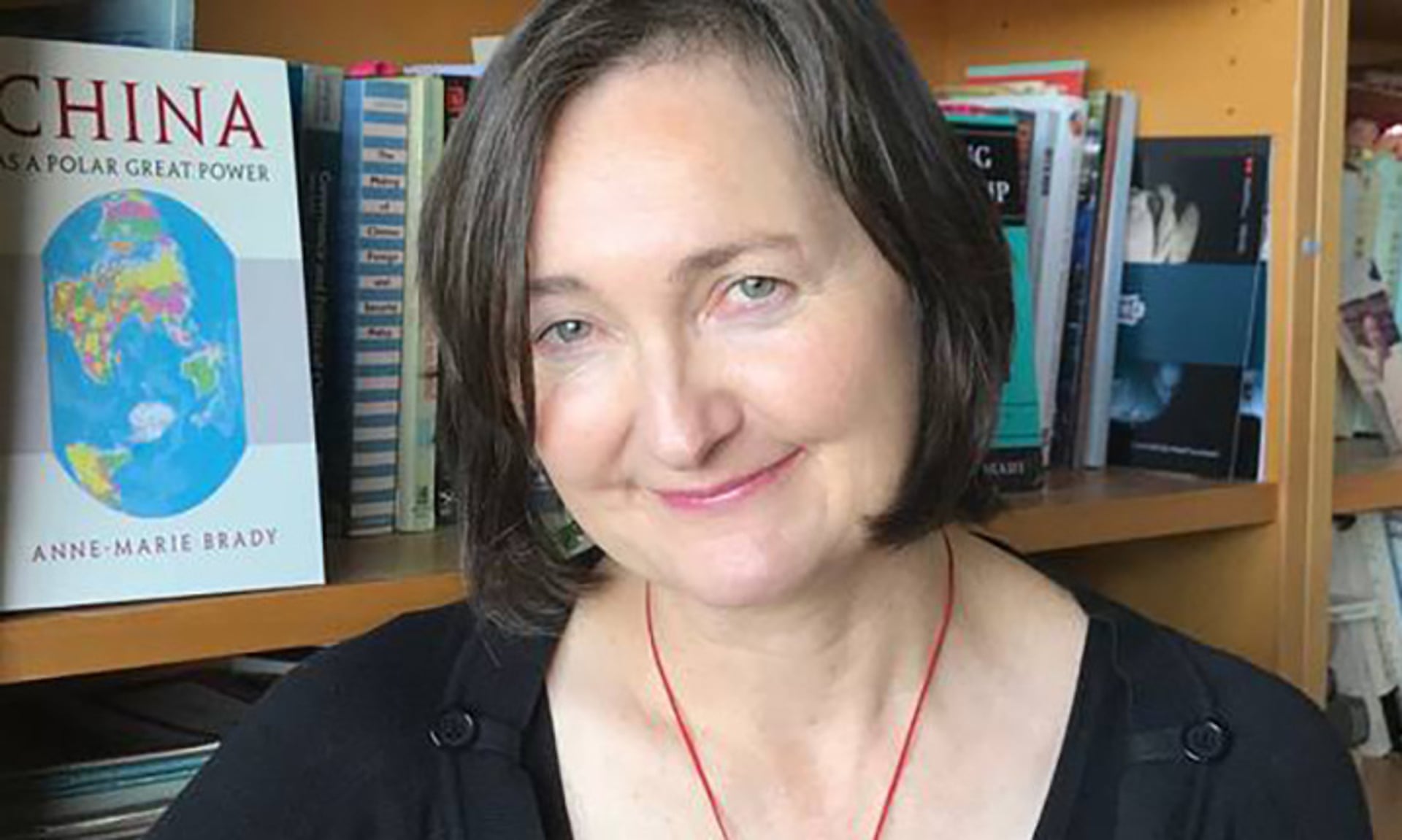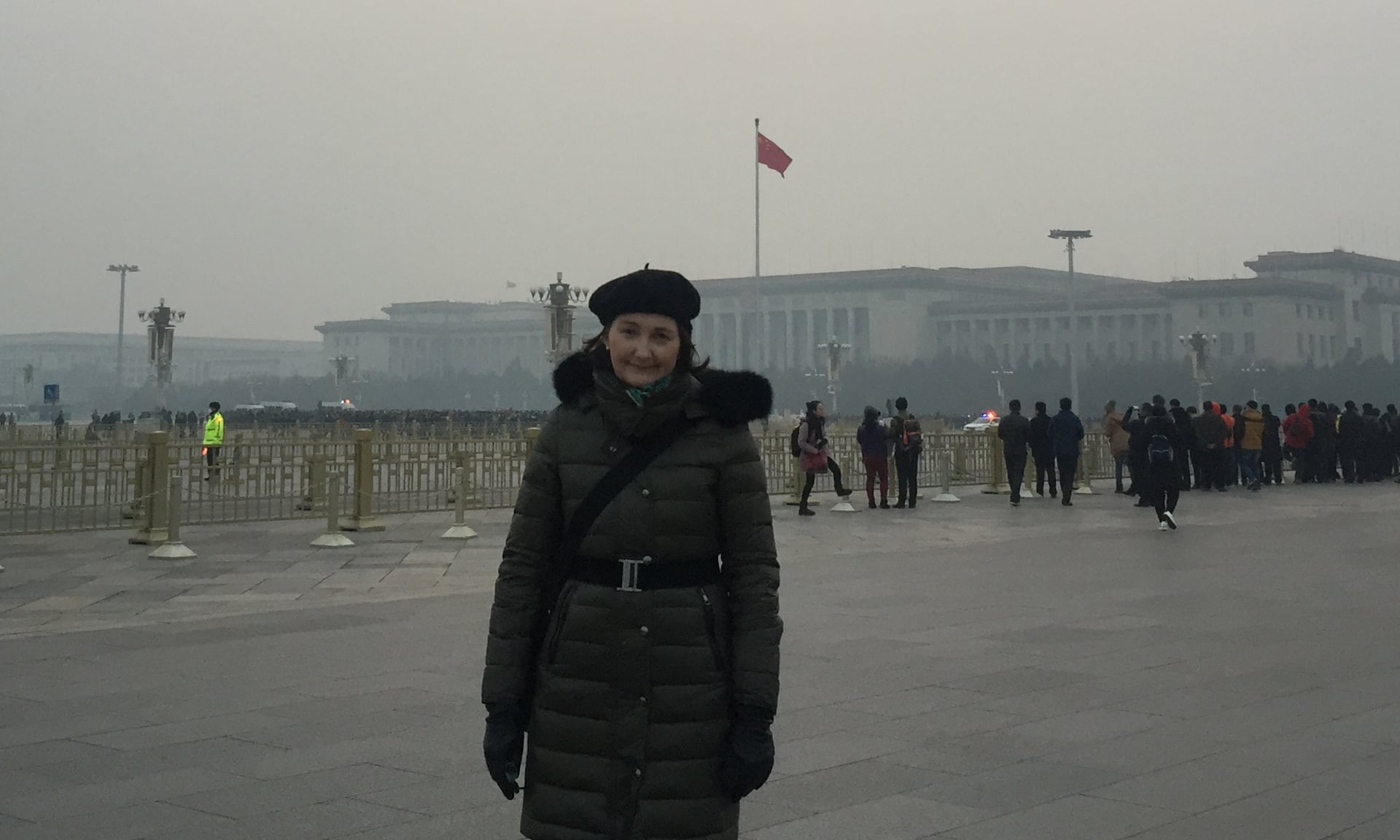Chinese intimidation tactics she has studied are now being used against her
By Eleanor Ainge Roy in Christchurch
Anne-Marie Brady, professor at the University of Canterbury. Chinese harassment has put a strain on her family life.
It’s just gone midday at Canterbury University and Professor Anne-Marie Brady is rock-hopping across a crystal clear stream.
The life-long academic takes an overgrown bush track to reach the Okeover community gardens, her eyes scanning the sky for native birds.
The life-long academic takes an overgrown bush track to reach the Okeover community gardens, her eyes scanning the sky for native birds.
It’s the height of summer in Christchurch and the garden is filled with rhubarb plants, clumps of chewy spinach and spring onions whose tips have turned white in the sun.
“I used to spend a lot of time here,” says Brady, 52, examining the beds, ploughed by academic staff and students wanting to unwind.
“I used to spend a lot of time here,” says Brady, 52, examining the beds, ploughed by academic staff and students wanting to unwind.
“I don’t any more.”
Brady has spent more than 25 years researching the Chinese Communist party (CCP), using her base in New Zealand as a refuge to work on her books, cook elaborate meals for her family and tend her vegetable and flower gardens.
“New Zealanders have a deep sense of complacency about their security and feel that they’re very far away from the problems that we are seeing unfold in other parts of the world – that’s just not true any more,” says Brady, sitting on a bench in the gardens, where her interview with the Guardian cannot be overheard.
“We are part of the international environment too, and what happened to me – having my home and workplace invaded – is a wake-up call for people.”
Watcher becomes the watched
In the past few months Brady has begun using humour to counter the fear, has seen a counsellor on police advice, and consciously “lives in the moment”.
Brady has studied the Chinese government’s propaganda and intimidation tactics for decades, so there is a level of irony to seeing it in her own life.
China a ‘challenge to our sovereignty’
Brady and her husband rejected overseas job offers to stay in New Zealand and raise their children in a “high-trust society”.
Brady has spent more than 25 years researching the Chinese Communist party (CCP), using her base in New Zealand as a refuge to work on her books, cook elaborate meals for her family and tend her vegetable and flower gardens.
But since the publication of her 2017 paper Magic Weapons, which details the extent of Chinese influence in New Zealand, Brady’s life has been turned upside down, becoming the target of a campaign of intimidation and psy-ops directed by Beijing towards her and her family.
The Chinese government has not responded to requests for comment.
Beginning in late 2017, Brady has had her home burgled and her office broken into twice.
Beginning in late 2017, Brady has had her home burgled and her office broken into twice.
Her family car has been tampered with, she has received a threatening letter (“You are the next”) and answered numerous, anonymous phone calls in the middle of the night, despite having an unlisted number.
The latest came at 3am on the day her family returned home after a Christmas break.
“I’m being watched”, she says.
A self-described “stoic”, Brady has had to draw on her experience of PTSD after the 2010 Christchurch earthquakes to help her handle the harassment.
“I have already protected myself in terms of all my information, and the rest is a mind game. It is meant to scare me… to cause mental illness or inhibit the kinds of things I write on – to silence me,” says Brady, her voice quavering slightly.
A self-described “stoic”, Brady has had to draw on her experience of PTSD after the 2010 Christchurch earthquakes to help her handle the harassment.
“I have already protected myself in terms of all my information, and the rest is a mind game. It is meant to scare me… to cause mental illness or inhibit the kinds of things I write on – to silence me,” says Brady, her voice quavering slightly.
“So I win by not being afraid.”
Close associates of Brady’s have also been visited by the Ministry of State Security in China.
Brady’s employer, Canterbury University, recently hired a security consultant to protect her office. New locks were fitted, CCTV introduced, and encryption software installed.
Despite three requests for expert government assistance, Brady and her husband – an artist from Beijing – have had to learn on the hoof how to protect their home, a suburban spot where they raise three teenage children, whose unease about the situation occasionally “manifests”, Brady says.
Close associates of Brady’s have also been visited by the Ministry of State Security in China.
Brady’s employer, Canterbury University, recently hired a security consultant to protect her office. New locks were fitted, CCTV introduced, and encryption software installed.
Despite three requests for expert government assistance, Brady and her husband – an artist from Beijing – have had to learn on the hoof how to protect their home, a suburban spot where they raise three teenage children, whose unease about the situation occasionally “manifests”, Brady says.
China scholar Anne-Marie Brady in Tiananmen Square, Beijing.
“New Zealanders have a deep sense of complacency about their security and feel that they’re very far away from the problems that we are seeing unfold in other parts of the world – that’s just not true any more,” says Brady, sitting on a bench in the gardens, where her interview with the Guardian cannot be overheard.
“We are part of the international environment too, and what happened to me – having my home and workplace invaded – is a wake-up call for people.”
Watcher becomes the watched
In the past few months Brady has begun using humour to counter the fear, has seen a counsellor on police advice, and consciously “lives in the moment”.
Brady has studied the Chinese government’s propaganda and intimidation tactics for decades, so there is a level of irony to seeing it in her own life.
The watcher has become the watched.
Under Xi Jinping’s leadership, China academics around the world are experiencing increasing intimidation.
Under Xi Jinping’s leadership, China academics around the world are experiencing increasing intimidation.
Some refuse to speak publicly for fear of reprisals or being refused visas to China.
“Kill the chicken to scare the monkey” – Brady says, quoting a Chinese idiom.
Dr Kevin Carrico, a lecturer at Macquarie University, has had sensitive segments of his lectures in Australian classrooms reported back to Beijing, whose officials have then visited the China-based parents of some students.
“People have come to realise that there’s no longer any kind of great firewall between academic practice in China and academic practice outside of China,” Carrico told Inside Higher Ed.
“Kill the chicken to scare the monkey” – Brady says, quoting a Chinese idiom.
Dr Kevin Carrico, a lecturer at Macquarie University, has had sensitive segments of his lectures in Australian classrooms reported back to Beijing, whose officials have then visited the China-based parents of some students.
“People have come to realise that there’s no longer any kind of great firewall between academic practice in China and academic practice outside of China,” Carrico told Inside Higher Ed.
China a ‘challenge to our sovereignty’
Brady and her husband rejected overseas job offers to stay in New Zealand and raise their children in a “high-trust society”.
That belief is slowly souring.
“We are so proud that we punch above our weight internationally, that we have a moral authority on the world stage.But in the last year I have really wondered about that,” says Brady.
“Here is an actual challenge to our sovereignty – and a New Zealand family who have had their safety threatened – and our government is not defending them.”
New Zealand police say they continue to investigate the malicious acts against Brady and that the case remained of “strong interest”.
A spokesperson for prime minister Jacinda Ardern said she “has not received any reports that there is an issue attributable to China”.
Since the intimidation started, Brady has pinned an image of New Zealand world war two spy Nancy Wake above her desk, and sought courage in the writings of George Orwell.
“My main job is to look after myself and keep doing what I’m doing, because it must surely matter if so much attention has been directed at me” she says, chuckling.
Brady has repeatedly been encouraged by government insiders to keep reading, digging, and publishing.
“We are so proud that we punch above our weight internationally, that we have a moral authority on the world stage.But in the last year I have really wondered about that,” says Brady.
“Here is an actual challenge to our sovereignty – and a New Zealand family who have had their safety threatened – and our government is not defending them.”
New Zealand police say they continue to investigate the malicious acts against Brady and that the case remained of “strong interest”.
A spokesperson for prime minister Jacinda Ardern said she “has not received any reports that there is an issue attributable to China”.
Since the intimidation started, Brady has pinned an image of New Zealand world war two spy Nancy Wake above her desk, and sought courage in the writings of George Orwell.
“My main job is to look after myself and keep doing what I’m doing, because it must surely matter if so much attention has been directed at me” she says, chuckling.
Brady has repeatedly been encouraged by government insiders to keep reading, digging, and publishing.
“I know the research I do is valued by our government, and my courage in speaking up is valued as well,” says Brady.
“But I am part of a changing geopolitical situation and my family is, too. And I have to handle that at the same time as be a mum, an academic, a colleague, a person who is at the supermarket … I have to be normal as well.”
“But I am part of a changing geopolitical situation and my family is, too. And I have to handle that at the same time as be a mum, an academic, a colleague, a person who is at the supermarket … I have to be normal as well.”

Aucun commentaire:
Enregistrer un commentaire